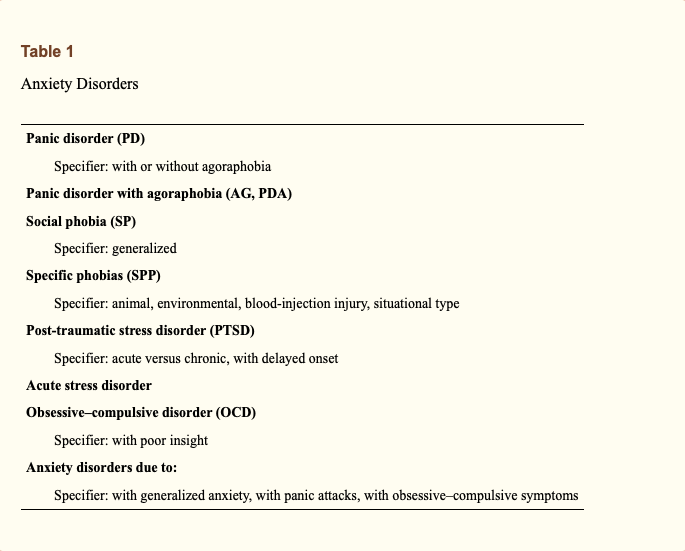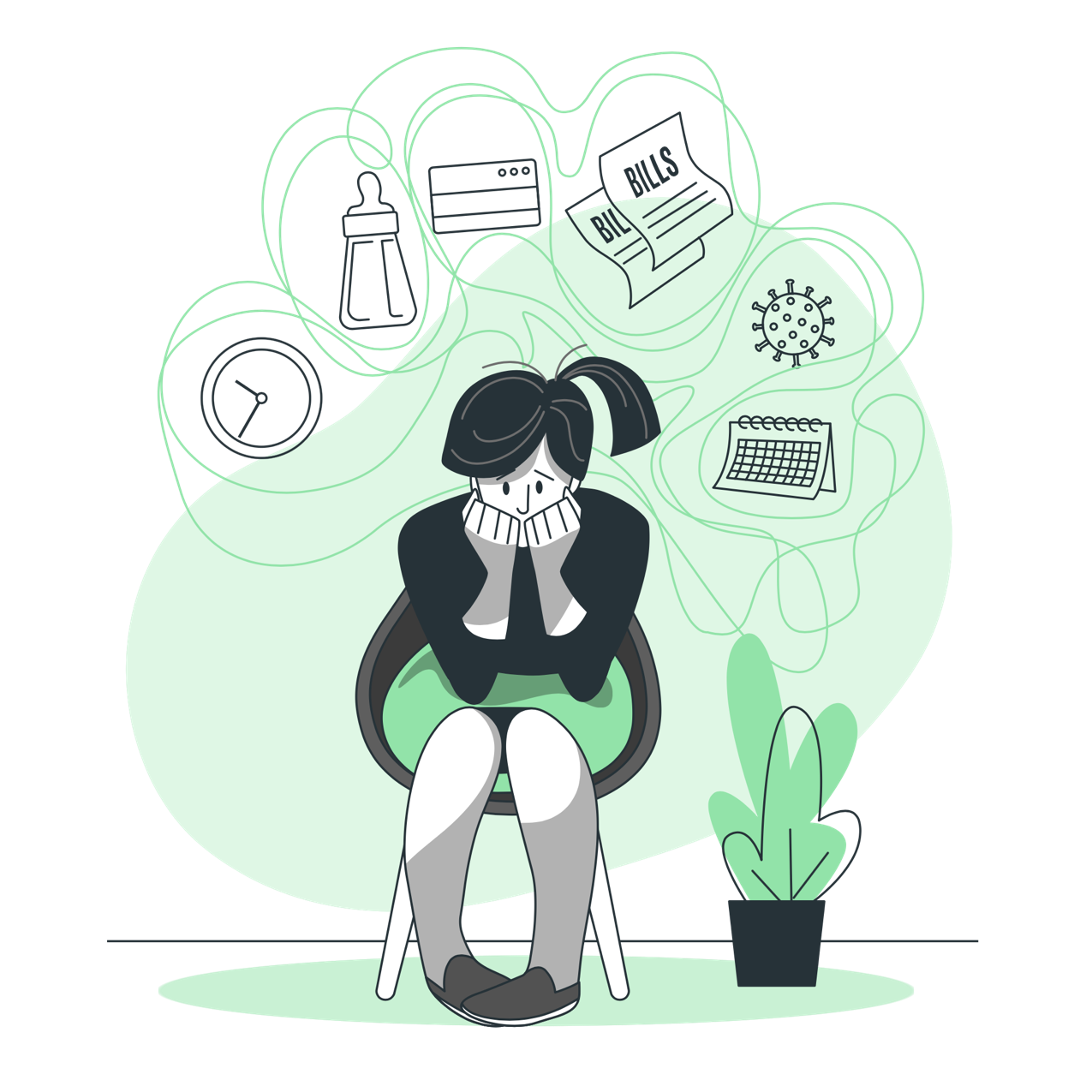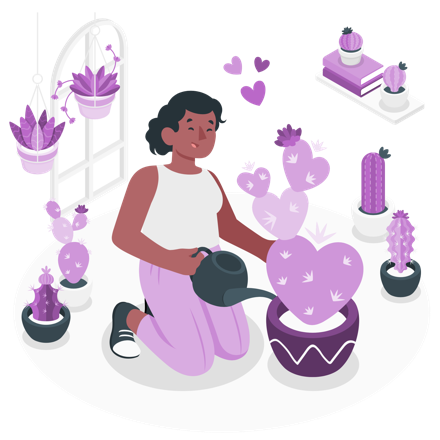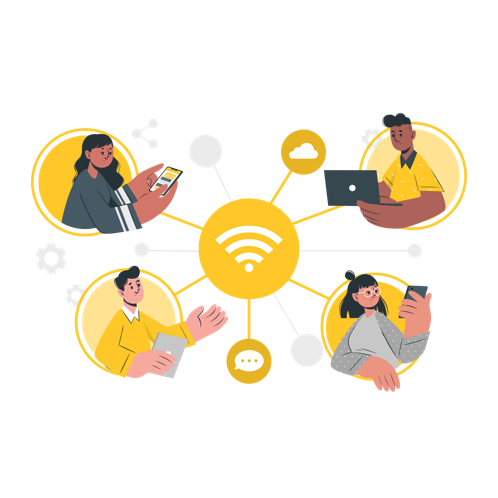What Is Anxiety?
According to research, “Anxiety disorders are the most prevalent mental health conditions. Although they are less visible than schizophrenia, depression, and bipolar disorder, they can be just as disabling. The diagnoses of anxiety disorders are being continuously revised […] More recently, the emphasis in diagnosis has focused on neuroimaging and genetic research. This approach is based partly on the need for a more comprehensive understanding of how biology, stress, and genetics interact to shape the symptoms of anxiety” (Bystritsky et.al., 2013). In addition, while anxiety may seem as a standalone or comprehensive term for one kind of mental health issue, it can, in fact, be better understood as an umbrella term. The table below from Bystritsky et.al. shows the different forms that anxiety exists in.

What Is Depression?
A research study explains, “We describe depression in radical behavioral terms, emphasizing the occasions on which the term is used and deemphasizing any underlying unitary disease, physiological, or emotional state to which the term refers. Depression comes from the late Latin word depressare and the classical Latin word deprimere. Deprimere literally means “press down”; de translates into “down” and premere translates into “to press.” In essence, the term appears to denote a feeling of heaviness, of being “pressed down,” that is also referred to as “sad,” “blue,” or simply “down.” Depression also refers to a depressed topography or the fact of being pressed down” (Kanter et.al., 2008). Similar to anxiety, depression ought also not be perceived as a narrow or definitive term,
The constellation of depressive disorders with shared characteristics suggests that the tact depression involves a variety of public and private antecedent stimulating events that vary from occasion to occasion but have sufficient overlapping properties to occasion consistent usage of the term. We view the diversity of additional symptoms represented by these disorders as consistent with the diversity of environmental causes of depression, physiological states labeled depression, and psychological responses to the environmental causes and physiological states. Thus, no overarching depressive syndromes are posited or assumed at this point. Nonetheless, commonalities in history, environmental antecedents, and symptom presentation exist and may guide treatment decisions. Thus, our understanding of depression must allow for the great variety of stimulus conditions that occasion use of the term (Kanter et.al., 2008).
Depression is spectrum, much like other mental health issues. It manifests differently for different people, which is why understanding it takes careful consideration, research and empathy.

What Is Stress?
Stress forms an essential and undeniable part of an organism’s response to its environment. Therefore, how much stress surrounds a human being and how well one is able to respond to stress can decide and affect the health and well-being of the individual,
Stressors have a major influence upon mood, our sense of well-being, behavior, and health. Acute stress responses in young, healthy individuals may be adaptive and typically do not impose a health burden. However, if the threat is unremitting, particularly in older or unhealthy individuals, the long-term effects of stressors can damage health. The relationship between psychosocial stressors and disease is affected by the nature, number, and persistence of the stressors as well as by the individual’s biological vulnerability (i.e., genetics, constitutional factors), psychosocial resources, and learned patterns of coping. Psychosocial interventions have proven useful for treating stress-related disorders and may influence the course of chronic diseases (Schneiderman et.al., 2005).
There are many mental health issues that find their source in stress-related disorders, which is why stress cannot be ignored as being something outside the spectrum of mental health.

Managing Mental Health During COVID-19
The instances of depression, anxiety and stress have drastically escalated during and after the COVID-19 pandemic. Consequently, mental health of many individuals has deteriorated. There are many ways to cope with depreciating mental health, especially during the ongoing pandemic.

- Take breaks: Make sure you disconnect from news about the pandemic often. Stay off social media, news updates, or even the newspaper. While it is necessary to stay updated about news related to the number of cases, vaccine rollouts and global statistics about the pandemic – it is also equally important to keep yourself healthy and happy. Try restricting yourself to being exposed to news only certain times in a day. For the rest of the time, make sure to vouch off all electronic devices that may give you hourly distressing updates about death or disease.
- Take care: Taking care of your body can be very important, especially during a time when it may feel both physically and mentally vulnerable. You must take care of your body by eating healthy, wel
 l-balanced and nutritive meals (even if the temptation to indulge in junk food or unhealthy comfort food is too strong!). Additionally, forming a regular exercise regimen can be extremely useful in maintaining physical and mental well-being. Getting a sufficient amount of sleep, especially at one stretch during the night is of utmost importance in order to remain healthy and fit. When you do feel anxious or stressed, it is important to tackle the problem immediately. Take deep breaths and calm yourself down by countering your fears with real facts. Refrain from consuming too much caffeine, sugar or other harmful substances as they may worsen your mental and physical health in the long run.
l-balanced and nutritive meals (even if the temptation to indulge in junk food or unhealthy comfort food is too strong!). Additionally, forming a regular exercise regimen can be extremely useful in maintaining physical and mental well-being. Getting a sufficient amount of sleep, especially at one stretch during the night is of utmost importance in order to remain healthy and fit. When you do feel anxious or stressed, it is important to tackle the problem immediately. Take deep breaths and calm yourself down by countering your fears with real facts. Refrain from consuming too much caffeine, sugar or other harmful substances as they may worsen your mental and physical health in the long run.

- Make connections: Other than taking breaks and making time to do the things you enjoy, you must also continue to make meaningful connections with individuals that you care about and that care about you. This will help you feel connected, heard, loved and most importantly, it will prevent you from feeling lonely. It is best to confide in someone you trust and discuss or share your fears and stress, especially related to the pandemic situation. Even while practicing social distancing, you can talk to and connect with people in your life through social media, telephones, video calling or text messaging.

- Online counselling: If you think that your fears and stress might be developing into graver mental health issues, then try online counselling. This is a safe way to seek help and try to improve your mental health during these trying times. If you feel like online counselling might be the method for you or just want to give it a try and see if it helps, you can book in a session with trained professionals through Takalam Online Counselling at: https://takalamhere.com
Making the most of Online Counselling
Online counselling has been an emerging form of therapy for a large part of the past decade. However, what aided in the sudden spike in instances of online counselling platforms has been the COVID-19 pandemic, “The outbreak of the COVID-19 pandemic has necessitated sudden and radical changes in mental health care delivery, as strict social distancing and lockdown measures were imposed in the early phases of the pandemic. Almost overnight, practitioners were forced to transfer their face-to-face care practice to online means” (Feijt et.al., 2020). In fact, Takalam Online Counselling also took its nascent steps during the beginning of the pandemic. It was evident to mental health therapists that the best way to tackle mental health issues during imposed lockdowns, curfews, and generally people being forced to stay indoors was to launch a way in which individuals could make the most of counselling, but remain away from the threat of contacting the infectious coronavirus – this is where online counselling came in.
